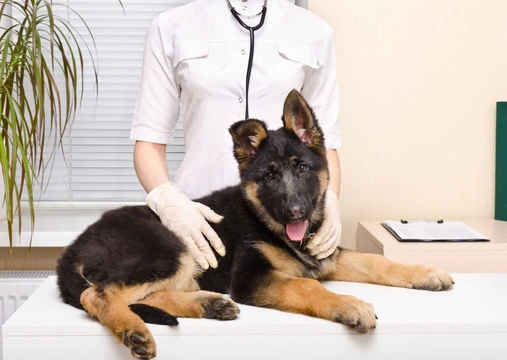
My Puppy has Hip Dysplasia, What Should I do?
Sadly, any dog can suffer from hip dysplasia, although larger dogs tend to be more affected by this painful condition than smaller breeds. It's a disorder that can be passed on from parent dogs to their offspring which is why it's so important for all dogs whether female or male, to be checked out before they are used in a breeding programme. Once a puppy has been diagnosed with hip dysplasia, the condition of an affected hip joint gets progressively worse and typically results in a dog suffering from osteoarthritis.
If you have just got a puppy and the vet finds they are suffering from hip dysplasia, the bad news is that they will have the condition for the rest of their lives. The reason being their hips will not develop as they should and this results in them not sitting properly in the joint sockets. Eventually, as time goes on, the condition of any affected joints gets progressively worse and the end result is they will suffer from painful osteoarthritis and there's no getting away from this fact.
So, what can you do?
Once the vet has established that a puppy's hips are not developing as they should which they would do by carrying out tests and watching how a young dog moves when they walk or run. The vet would have ruled out any neurological reasons why a puppy might be moving strangely. They would also need to take X-rays of a puppy's hips to determine how badly they are sitting in their sockets and ideally, two lots of X-rays would need to be taken to establish how bad their condition actually is.
If the vet finds a puppy is already suffering from osteoarthritis even at a very young age, they would not be able to undergo any sort of surgery to correct the problem. But all is not lost because there are many things an owner can do to help their pet, one of which is to slow down their growth rate. With the help and advice of a vet, young affected puppies can put on a diet to ensure they grow at a slower rate. Research has shown that allowing a fast rate of growth can make the condition that much worse so by slowing it down, you are in effect helping your puppy. In short, should a puppy be diagnosed as suffering from hip dysplasia, keeping a puppy or dog on the lean side so you can just feel their ribs, is far better for them than it is for them to carry too much weight .
Joint supplements
Again, with the help and advice of your vet, it is also a good idea to add a joint supplement to your puppy's food. There's a choice of very good joint supplements specifically designed for dogs suffering from joint disorders, but it is best to work with your vet and to give your dog products that they recommend.
Swimming
It's also a very good idea to get your puppy swimming and to do so on a regular basis. Ideally, this should be at least five times a week and to make sure they swim for at least 30 minutes a day. Swimming helps keep the muscle tone in a puppy or dog's back legs nice and strong which means they are more capable of supporting their weakened hips.
NSAIDS
As puppy gets older, the vet could recommend they are given NSAIDS which is are non-steroidal anti-inflammatory drugs and typically these are given in very low doses to begin with. However, if their condition gets a lot worse, and the condition is causing an older dog a lot of pain and discomfort, the vet might suggest a dog has a total hip replacement (THR).
Total Hip Replacement
This type of surgery does carry a few risks. If all goes well, a dog would make a full recovery and they would be totally mobile and pain-free again. However, if things don't go to plan, the results of the operation can be disastrous.
Femoral head and Neck Ostectomy (FHO)
Another option for an older dog with the condition, is to undergo another type of surgery which is known as a femoral head and neck ostectomy (FHO). This sees a vet removing the offending part of the joint. The prognosis is usually very good and dogs go on to lead happy and comfortable lives feeling no pain in their joint at all.
Acupuncture
Acupuncture can also help relieve the pain and discomfort a dog might be feeling when they have first been diagnosed with hip dysplasia and when they are already suffering from osteoarthritis. It could also help put off any surgery until it becomes unavoidable.
Rehabilitation
If a vet recommends your puppy or dog undergoes any sort of surgery to make their lives more comfortable, they would also advise that rehabilitation is a necessary part of their recovery process. It would be very worthwhile to enrol the help of a certified professional to begin with which means you get to see and learn about the right sort of exercises that would be of benefit to your dog.



